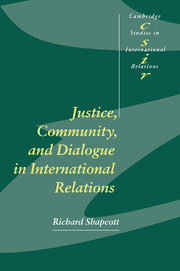Book contents
- Frontmatter
- Contents
- Acknowledgements
- Introduction
- 1 Beyond the cosmopolitan/communitarian divide
- 2 Community and communication in interpretive theories of international relations
- 3 Emancipation and legislation: the boundaries of conversation in poststructuralism and the critical theory of IR
- 4 Philosophical hermeneutics: understanding, practical reasoning and human solidarity
- 5 Philosophical hermeneutics and its critics
- 6 Towards a thin cosmopolitanism
- Conclusion
- Bibliography
- Index
- CAMBRIDGE STUDIES IN INTERNATIONAL RELATIONS
6 - Towards a thin cosmopolitanism
Published online by Cambridge University Press: 22 September 2009
- Frontmatter
- Contents
- Acknowledgements
- Introduction
- 1 Beyond the cosmopolitan/communitarian divide
- 2 Community and communication in interpretive theories of international relations
- 3 Emancipation and legislation: the boundaries of conversation in poststructuralism and the critical theory of IR
- 4 Philosophical hermeneutics: understanding, practical reasoning and human solidarity
- 5 Philosophical hermeneutics and its critics
- 6 Towards a thin cosmopolitanism
- Conclusion
- Bibliography
- Index
- CAMBRIDGE STUDIES IN INTERNATIONAL RELATIONS
Summary
Communities are to be distinguished, not by their falsity/genuineness, but by the style in which they are imagined.
This enquiry began with the words of Paul Ricouer, who suggested that a genuine conversation between the cultures of the world, which was not an act of violence or assimilation, has yet to take place. This book has taken the development of a model of such a conversation as its motivating goal. It has argued that if such a ‘genuine’ conversation of cultures and civilisations is to occur, then Gadamer's account of philosophical hermeneutics provides an appropriate model of how it might proceed. Having outlined the meaning of philosophical hermeneutics and its contribution to our understanding of communication, the task of this chapter is to chart the implications of the preceding argument for the nature of political community and ethical action in international relations.
This chapter begins, in a preliminary fashion, to outline a more complete account of the philosophical hermeneutic contribution to the cosmopolitan project. The principal insight to draw from this discussion is that the essential task of a thin cosmopolitanism is to enable a genuine conversation between different cultures and civilisations. Cosmopolitanism, then, is reconstituted, or re-imagined, as a vehicle for inter-cultural conversation. This chapter also argues that the philosophical hermeneutic account leaves open the possibility that thicker cosmopolitan communities may develop.
The chapter is divided into two sections.
- Type
- Chapter
- Information
- Justice, Community and Dialogue in International Relations , pp. 209 - 232Publisher: Cambridge University PressPrint publication year: 2001

